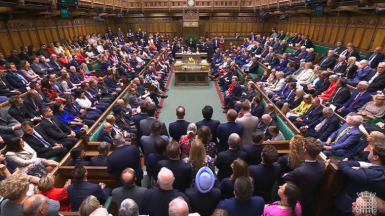
Church leaders have expressed deep disappointment after the House of Commons voted in favour of legalising assisted suicide.
Kim Leadbeater's Terminally Ill Adults (End of Life) Bill passed at its Third Reading on Friday, albeint with a narrow majority that had been reduced by more than a half.
It will now progress to the House of Lords where it faces further scrutiny before being returned to the Commons.
Sarah Mullally, the Bishop of London and a former Chief Nursing Officer for England, expressed disappointment that the bill had passed despite "mounting evidence that it is unworkable and unsafe and poses a risk to the most vulnerable people in our society".
"These unresolved concerns were raised in many speeches by MPs today and are demonstrated by the reduced Commons majority in favour," she said.
“If enacted, this legislation would come into force amid serious shortfalls in adult social care, a postcode lottery in palliative care and well documented pressures on the NHS, multiplying the potential risks to the most vulnerable.
"It does not prevent terminally ill people who perceive themselves to be a burden to their families and friends from choosing ‘assisted dying. And it would mean that we became a society where the state fully funds a service for terminally ill people to end their own lives but shockingly only funds around one third of palliative care."
She repeated earlier calls for improved quality and access to palliative care rather than funding assisted suicide.
“Every person is of immeasurable and irreducible value, and should be able to access the care and support that they need – a principle that I know is shared by those all faiths and none," she said.
“We must oppose a law that puts the vulnerable at risk and instead work to improve funding and access to desperately needed palliative care services.”
Gavin Calver, head of the UK Evangelical Alliance, said on social media that he was "utterly devastated that Parliament has voted in favour of the assisted dying bill".
"An awful end to a terrible week in Westminster for those of us who believe passionately in the sanctity of life. Lord have mercy," he said.
Archbishop John Sherrington, Catholic Church's lead bishop for life issues, said he was concerned about the future of palliative care and Catholic-run hospices "not least because experience suggests that, unless there are explicit protections, hospices may be required to cooperate with assisted suicide".
"If this were to happen, the future of many Catholic institutions could be under threat," he said.
"This is not the end of the parliamentary process, and we should not lose hope. We ask the Catholic community to continue to pray for members of parliament whilst they consider this legislation and to pray that government will act to promote and protect life from conception until natural death.
"We have expressed the view, during this debate, that genuine compassion involves accompanying those who need care, especially during sickness, disability and old age.
"The vocation to care is at the heart of the lives of so many people who look after their loved ones and is the sign of a truly compassionate society.
"As we stated after the second reading, it is essential that we nurture and renew the innate call that many people have to compassionately care for others."













